11 Healthiest Cereals on Grocery Shelves, According to Dietitians
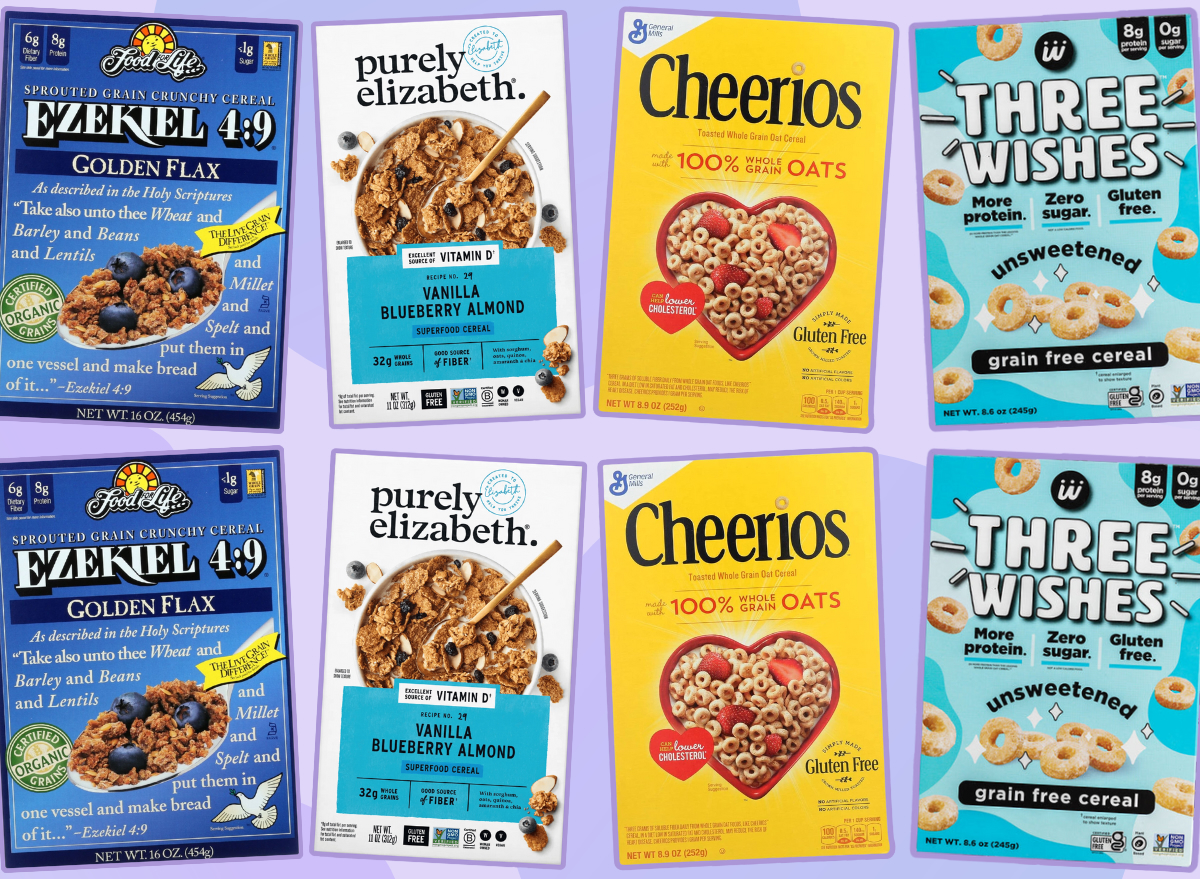
Cereal is one of the quickest and easiest breakfast options—and depending on the type, it can also be a healthy choice. While many traditional cereals are loaded with refined carbs, added sugar, and preservatives, gone are the days when breakfast bowls are filled to the brim with empty carbs and sugar. Now, there are plenty of healthy cereals you can stock up on that can fill your body with more whole grains, fiber, protein, and fewer added sugars.
The best healthy cereals provide what your body needs—essential vitamins, minerals, and fiber—and none of what you don’t, like too much added sugar.
Sorting out which cereals are truly worth buying and which are better left on the shelf can still be tricky. That’s why we asked registered dietitians for what cereal brands they recommend grabbing next time you’re at the grocery store. Keep reading to find out their recommendations, and for more, don’t miss 10 Best High-Protein Yogurts, According to a Dietitian.
The Best Healthy Cereals
- Cheerios
- Three Wishes Unsweetened Cereal
- Purely Elizabeth Vanilla Blueberry Almond Superfood Cereal With Vitamin D
- Nature's Path Organic Heritage Flakes
- Ezekiel 4:9 Organic Sprouted Whole Grain Cereal, Golden Flax
- Quaker Oatmeal Squares
- Post Shredded Wheat
- Catalina Crunch Cinnamon Toast
- Seven Sundays Rise & Shine Muesli Cereal
- 365 Bran Flakes
- Lovebird Unsweetened Cereal
Cheerios
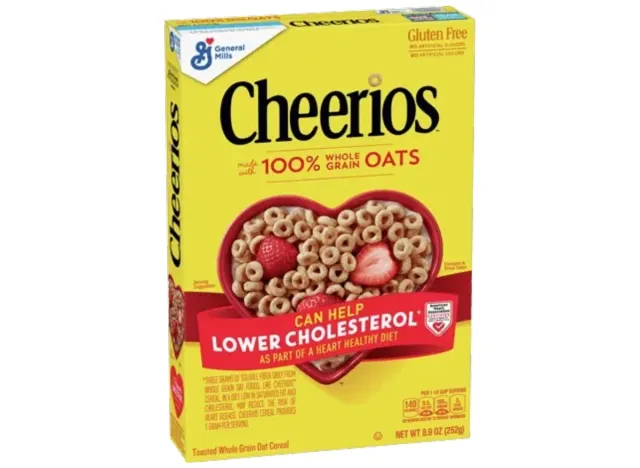
Calories: 140
Fat: 2.5 g (Saturated Fat: 0.5 g)
Sodium: 190 mg
Carbs: 29 g (Fiber: 4 g, Sugar: 2 g)
Protein: 5 g
“There is a reason why Cheerios is a classic. With just 2 grams of added sugar per serving, Cheerios is one of the most popular cereals out there that is actually low in added sugar. Cheerios also does have a lot of fiber compared to other cereal brands. They are made primarily from whole-grain oats which can play a role in lowering cholesterol and even blood sugar levels. Just make sure you’re opting for the original flavor and not the others that may be higher in added sugar,” Brittany DeLaurentis, MPH, RD, CSO, LD adds.
Cheerios has one of the highest serving sizes on the market with a one-and-one-half cup portion accounting for just 140 calories.
Three Wishes Unsweetened Cereal
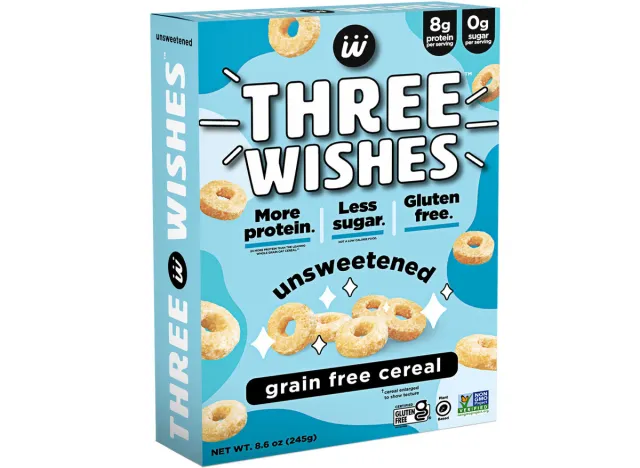
Calories: 120
Fat: 2 g (Saturated Fat: 0 g)
Sodium: 130 mg
Carbs: 17 g (Fiber: 3 g, Sugar: 0 g)
Protein: 8 g
This cereal is a perfect alternative to sugary cereal brands, says Joanna Ayalloore, MS, RD, LDN, owner of Nutrition Kept Simple. “One serving contains 120 calories, 8 grams of protein, 130 milligrams of sodium, no added sugars, and 3 grams of fiber. It can be used as a topping for yogurt parfaits, with a bowl of milk, trail mixes, or simply as a sweet treat,” she continues.
Purely Elizabeth Vanilla Blueberry Almond Superfood Cereal With Vitamin D
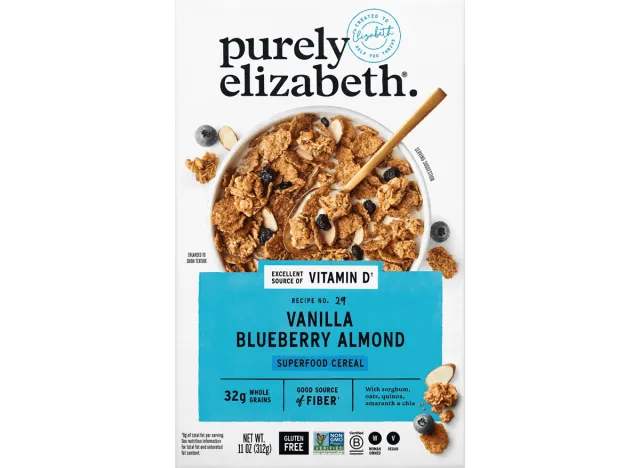
Calories: 230
Fat: 8 g (Saturated Fat: 4 g)
Sodium: 95 mg
Carbs: 35 g (Fiber: 4 g, Sugar: 9 g)
Protein: 5 g
“This cereal is an excellent way to start your morning,” says Sydney Greene, MS, RD. “One bowl has 6 grams of fiber, 5 grams of protein, and only 8 grams of added sugars, and this cereal is made from whole foods and is fortified with vitamin D to support overall health and wellbeing.”
Nature’s Path Organic Heritage Flakes
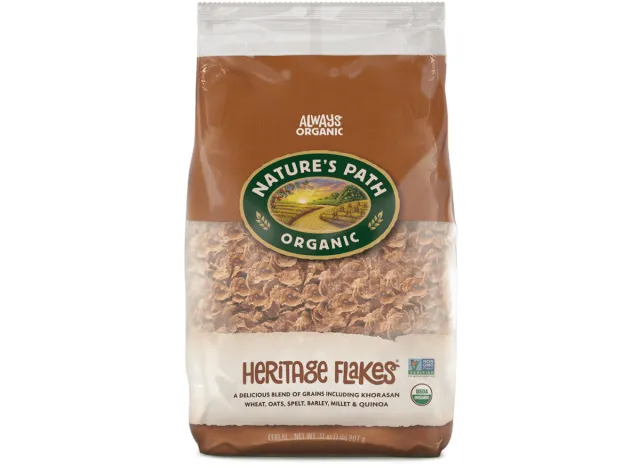
Calories: 160
Fat: 1.5 g (Saturated Fat: 0 g)
Sodium: 170 mg
Carbs: 31 g (Fiber: 7 g, Sugar: 5 g)
Protein: 5 g
“This cereal uses Kamut, an ancient grain that is easier to digest than modern day wheat varieties,” says Greene. “This product is also organic and free of GMO ingredients. One serving provides a whopping 7 grams of fiber, 5 grams of protein, and a small amount of added sugar.”
Ezekiel 4:9 Organic Sprouted Whole Grain Cereal, Golden Flax
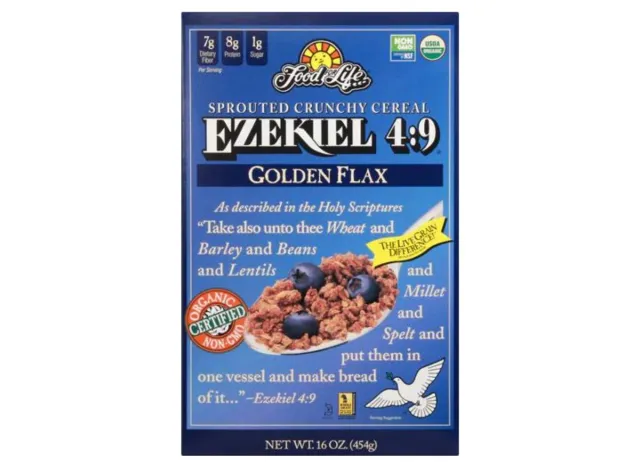
Calories: 190
Fat: 3 g (Saturated Fat: 0 g)
Sodium: 160 mg
Carbs: 35 g (Fiber: 7 g, Sugar: 1 g)
Protein: 8 g
“While many cereals are loaded with added sugar, this cereal has none,” the The Nutrition Twins Tammy Lakatos Shames, RDN, CDN, CFT, and Lyssie Lakatos, RDN, CDN, CFT, point out.
“All of the grains here are organic, high in fiber, and are sprouted, as well. So, they’re easier to digest and higher in nutrients than unsprouted grains,” they say.
“The folate and iron-rich lentils and soybeans used, which both are rich sources of antioxidants, fiber, and phytonutrients, are sprouted as well,” the Nutrition Twins add.
Quaker Oatmeal Squares
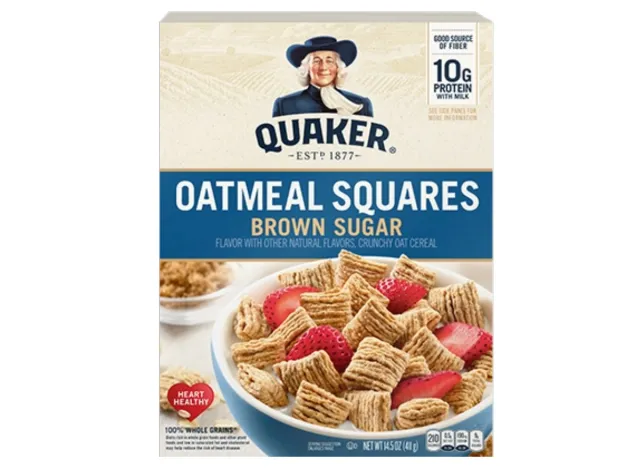
Calories: 210
Fat: 3 g (Saturated Fat: 0.5 g)
Sodium: 190 mg
Carbs: 44 g (Fiber: 5 g, Sugar: 9 g)
Protein: 6 g
“One of my favorite cereals to recommend for folks looking to add more whole grains to their eating pattern are Quaker Oatmeal Squares. Squares are not only filling and tasty, but they are packed with nutrition as well, containing 5 grams of fiber and 6 grams of protein per 1 cup of cereal. The brown sugar flavor is my personal favorite,” says McKenzie Caldwell, MPH, RDN, a fertility and prenatal dietitian.
Post Shredded Wheat
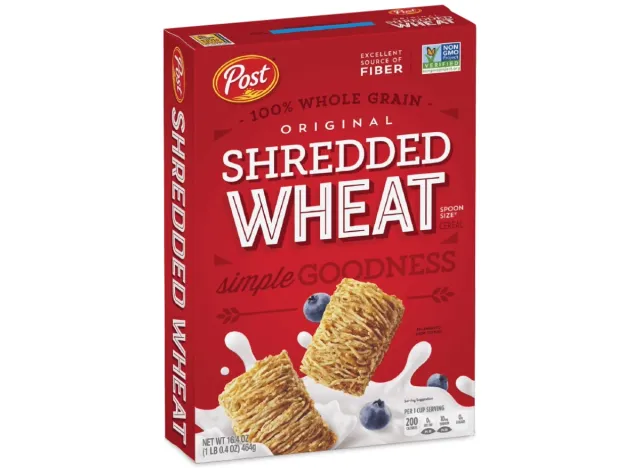
Calories: 210
Fat: 1.5 g (Saturated Fat: 0 g)
Sodium: 0 mg
Carbs: 49 g (Fiber: 8 g, Sugar: 7 g)
Protein: 7 g
“Post Shredded Wheat is 100% whole grain wheat and has zero sodium and sugar. It is higher in calories due to the higher carbohydrate content, but I count it as a win in terms of being part of a balanced breakfast. This cereal also has a whopping 8 grams of fiber and 7 grams of protein per serving,” says Kiran Campbell, RDN.
Catalina Crunch Cinnamon Toast
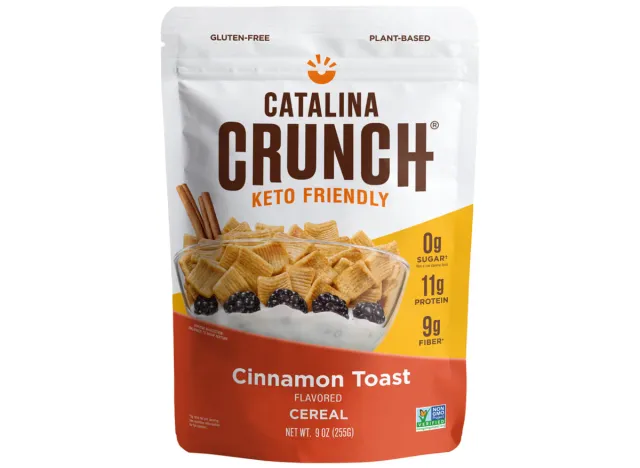
Calories: 110
Fat: 5 g (Saturated Fat: 0.5 g)
Sodium: 110 mg
Carbs: 14 g (Fiber: 9 g, Sugar: 0 g)
Protein: 11 g
Catalina Crunch is a keto-friendly cereal and is a great option for folks who are looking to keep their breakfast low-carb or are watching their blood sugar for health reasons. These cereals are also a good source of protein with 11 grams per serving and 9 grams of fiber to boot. If you’re looking for foods that are low carb but still offer nostalgic flavors like their Cinnamon Toast Crunch, you’ll want to check this one out!
Seven Sundays Rise & Shine Muesli Cereal
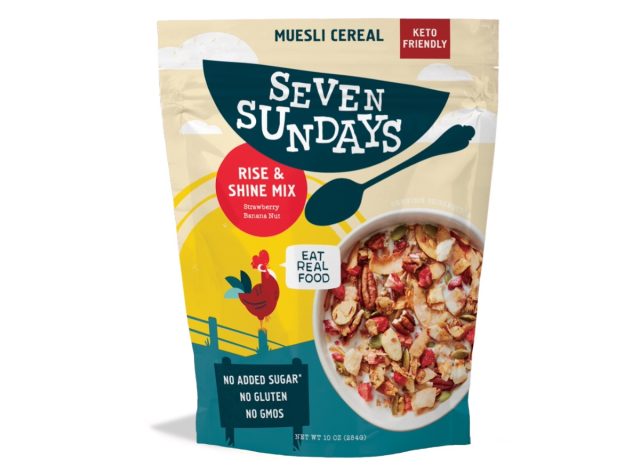
Calories: 170
Fat: 14 g (Saturated Fat: 4.5 g)
Sodium: 5 mg
Carbs: 9 g (Fiber: 4 g, Sugar: 4 g)
Protein: 5 g
“Seven Sundays Keto Nut Granola is another great low-carb breakfast option! It has no added sugar, 4 grams of fiber, and just 5 grams of net carbs per serving. Add some low-carb yogurt like Two Good and you’ll have a delicious low-carb high protein breakfast ready in no time,” adds Lara Clevenger MSH, RDN, CPT.
The serving size here is on the small side, as one-third cup of granola is a pretty standard serving. Consider using this cereal as a topping for yogurt to make it even more balanced and prevent overdoing your portions.
365 Bran Flakes
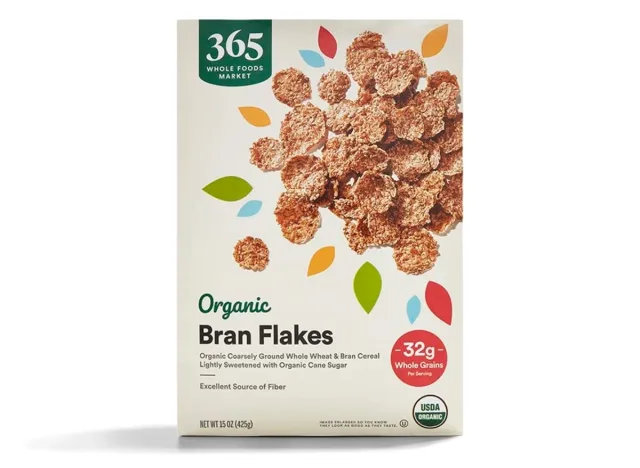
Calories: 130
Fat: 1 g (Saturated Fat: 0 g)
Sodium: 125 mg
Carbs: 32 g (Fiber: 7 g, Sugar: 3 g)
Protein: 5 g
With 130 calories and 7 grams of fiber per serving, these bran flakes are hard to beat when it comes to nutrition. High-fiber cereal has been shown to help with regular bathroom habits, lowering cholesterol, and improving heart health. These bran flakes boast 15% of your daily value of iron to boot—a great addition for kids and plant-forward folks.
RELATED: 12 Healthy, High-Fiber Cereals for Better Gut Health
Lovebird Unsweetened Cereal

Calories: 110
Fat: 1 g (Saturated Fat: 0.5 g)
Sodium: 55 mg
Carbs: 25 g (Fiber: 2 g, Sugar: 0 g)
Protein: 1 g
Julie Balsamo, MS, RDN comments on a high-fiber cereal that is also a great option for folks with food allergies or intolerances: “Lovebird is organic, non-GMO, grain-free and a great option for those with dietary restrictions as it’s both gluten and dairy free! Looking more specifically at the ingredients, Love Bird utilizes cassava flour which is a good source of prebiotic fiber (to support gut health), and is high in resistant starch to help control blood sugar!”
How To Shop for Healthy Cereals
There were a handful of nutrients that dietitians agree are important to look for when scanning the nutrition label.
- Whole grains: Most cereals are a source of carbohydrates, and you want to look for whole grains as your primary carbohydrate ingredient. This could be wheat, brown rice, oats, or brand. Whole grains provide more nutrition, vitamins and minerals, and fiber to balance your bowl of cereal.
- Fiber: High-fiber cereal can be hard to come by, and it’s not always the most flavorful as it is often made with wheat bran and tastes quite hearty. While the daily nutrition target for fiber is 25 grams per day, shooting for at least five grams of fiber in your bowl of cereal is a good start. You can always use a “nutrition by addition” approach to cereal and add some fruit like berries or sliced banana on top for more fiber.
- Added sugars: Even healthy cereals can have a significant source of added sugar. On the nutrition label, be sure to take a look at the section under “Total Sugars” that tells you exactly how many added sugars are in the product. The daily goal for added sugars for women is 24 grams and for men is 38 grams. Consider finding options low in added sugar and then increase the sweetness on your own with fruit on top.









